

Interview with Howard Gardner: In search of professional ethicists - do they exist? What can be done to preserve and strengthen the quality of our professions?
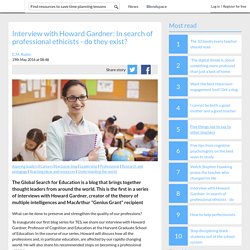
To inaugurate our first blog series for TES, we share our interview with Howard Gardner, Professor of Cognition and Education at the Harvard Graduate School of Education. In the course of our series, Howard will discuss how all the professions and, in particular education, are affected by our rapidly changing world. He will also share his recommended steps on becoming a professional ethicist. Howard, why a blog called “The Professional Ethicist”? To begin with, the title harbors a triple pun. To turn serious, I believe that the range of professions – from architecture to veterinary medicine, from education to the ministry, are vital and precious human inventions.
Building the 21st-Century Mind. Howard Gardner is a professor of cognition and education at the Harvard Graduate School of Education.
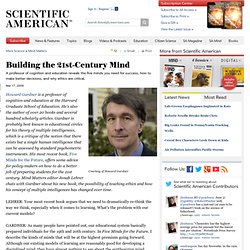
He’s also the author of over 20 books and several hundred scholarly articles. Gardner is probably best known in educational circles for his theory of multiple intelligences, which is a critique of the notion that there exists but a single human intelligence that can be assessed by standard psychometric instruments. His most recent book, Five Minds for the Future, offers some advice for policy-makers on how to do a better job of preparing students for the 21st century. Mind Matters editor Jonah Lehrer chats with Gardner about his new book, the possibility of teaching ethics and how his concept of multiple intelligences has changed over time. LEHRER: Your most recent book argues that we need to dramatically re-think the way we think, especially when it comes to learning. Howard Gardner. Howard Gardner: Truth, Beauty, and Goodness Reframed.
Educating for innovative societies. Professor Howard Gardner, Hobbs Professor of Cognition and Education at the Harvard Graduate School of Education, answers questions posed by educationtoday's editor Cassandra Davis during his visit to OECD to present at the Centre for Educational Research and Innovation conference on Educating for Innovative Societies.Cassandra Davis:In your book “Five minds for the future”, you call for the development of five types of thinking: the disciplined, synthesizing, creative, respectful and ethical.
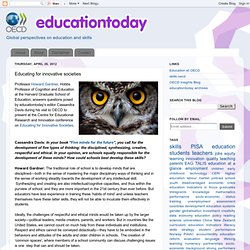
In your opinion, are schools equally responsible for the development of these minds? How could schools best develop these skills? Howard Gardner: The traditional role of school is to develop minds that are disciplined—both in the sense of mastering the major disciplinary ways of thinking and in the sense of working steadily towards the development of any intellectual skill.
CD: If you could change one thing in school practices, what would it be? Why? Photo credit: Ammit / © Shutterstock. A good test is where students do well if they really understand the material - Economy and Politics. Updated: Wed, Feb 08 2012. 12 12 PM IST New Delhi/Hyderabad: Howard Gardner, the proponent of the theory of multiple intelligences, challenges the belief that people possess a uniform intellectual capacity that can be measured by standardized tests.
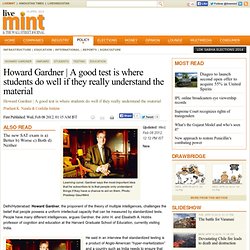
People have many different intelligences, argues Gardner, the John H. and Elisabeth A. Hobbs professor of cognition and education at the Harvard Graduate School of Education, currently visiting India. Learning curve: Gardner says the most important idea that he subscribes to is that people only understand things if they have a chance to act on them. Photo: Pradeep Gaur/Mint He said in an interview that standardized testing is a product of Anglo-American “hyper-marketization” and a country such as India needs to ensure that the nation’s islands of excellence don’t just remain that. You have said that standardized testing to compare learning levels across countries may not be a great example to follow.
Watch Video How should one go about it then? Home - Visual Thinking Strategies. Project Zero Classroom with Programs in Professional Education at the Harvard Graduate School of Education. What You Will Learn Create classrooms, instructional materials and out-of-school learning environments that promote deep learning and understanding.
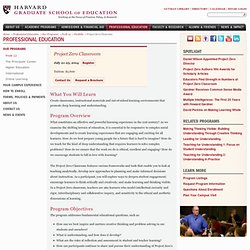
Program Overview What constitutes an effective and powerful learning experience in the 21st century? As we examine the shifting terrain of education, it is essential to be responsive to complex social developments and to create learning experiences that are engaging and exciting for all learners. How do we best prepare young people for a future that is hard to imagine? The Project Zero Classroom features various frameworks and tools that enable you to look at teaching analytically, develop new approaches to planning and make informed decisions about instruction. Excellence Ethics Engagement. Good work: when excellence and ... - Howard Gardner, Mihaly Csikszentmihalyi, William Damon. The GoodWork Project. Reviews and Ratings for Family Movies, TV Shows, Websites, Video Games, Books and Music.
Gardner’s GoodPlay Project Releases “Our Space” Curriculum. By Jill Anderson Professor Howard Gardner and the GoodPlay Project recently released a casebook of curricular materials called, Our Space: Being a Responsible Citizen of the Digital World.
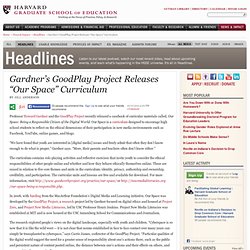
Our Space is a curriculum designed to encourage high school students to reflect on the ethical dimensions of their participation in new media environments such as Facebook, YouTube, online games, and blogs. “We have found that youth are interested in [digital media] issues and freely admit that often they don’t know enough to do what is proper,” Gardner says. “More, their parents and teachers often don’t know either.” The curriculum contains role-playing activities and reflective exercises that invite youth to consider the ethical responsibilities of other people online and whether and how they behave ethically themselves online.
The research explored people’s views on the digital landscape, especially with youth and children. Our Space: Being a Responsible Citizen of the Digital World. Truth, Beauty, and Goodness Reframed: Educating for the Virtues in the Twenty-First Century (9780465021925): Howard Gardner. A Fair(y) Use Tale. אינו זמין.